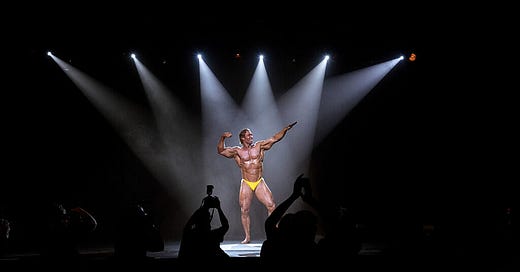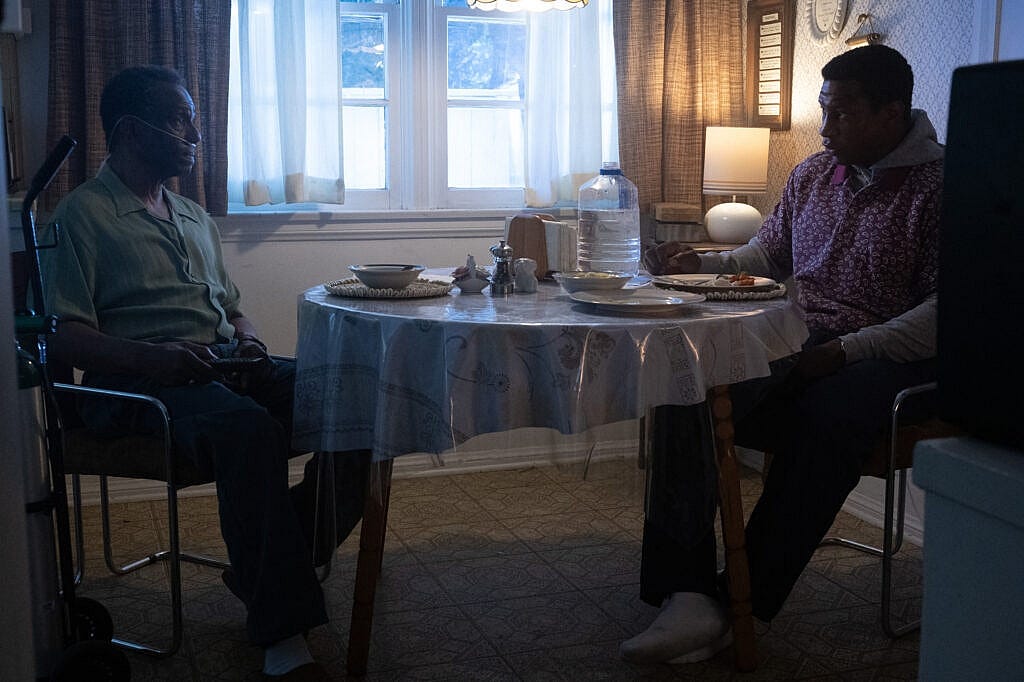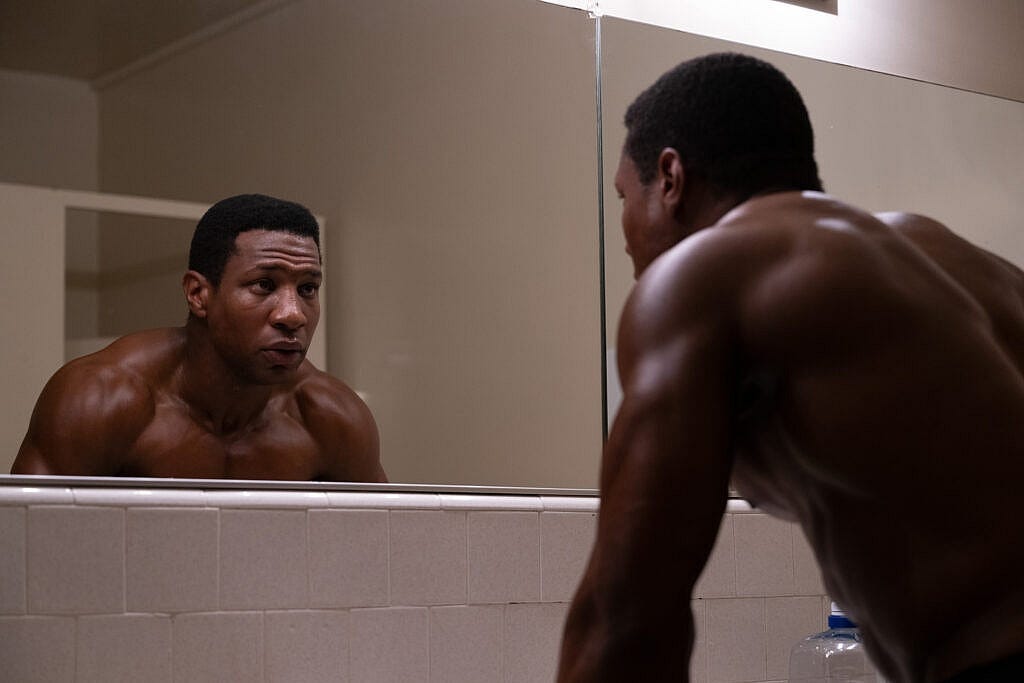Magazine Dreams (2023)
A lonely bodybuilder, desperate for fame, struggles with his violent impulses
Magazine Dreams (2023)
In theaters
Reading novels, we can be pulled into the mind of an isolated, troubled protagonist. Whether he’s a hero, anti-hero or slithers between the two, turning pages, we can keep asking ourselves whether we’re with this guy or against him.
Raskolnikov, Holden Caulfield or Ralph Ellison’s Invisible Man all give us time to think about how implicated we want to be.
But movies give us only a couple of hours to see how long a troubled protagonist can hold out against the forces trying to subdue him. Watching we only have so much time to consider whose side we’re on – his or the society he can’t fit into.
Complicating matters, even a volatile character can become transfixing on the big screen.
The classic movie outsider is that weary sick soul, the glowering, Mohawk-wearing, gun-toting Travis Bickle in Scorsese’s Taxi Driver (1976).
New York City’s seedy enclaves, awash with drifters, thugs, purse snatchers, drag queens, pimps and prostitutes, coupled with the glamorous political figures Travis ferries in his cab, take on an eerie hot glow that pushes him over the edge.
In Magazine Dreams Killian Maddox (Jonathan Majors) seems to have been born on the edge. While he was young, his father shot his mother to death and then killed himself. Aloneness has stalked Killian ever since.
He’s an obsessed bodybuilder sharing a comfortable suburban ranch house with his ailing grandfather William (Harrison Page).
Killian is all but overwhelmed by photos of body builders he admires, emulates, is determined to outperform and be photographed next to. But when we meet him, he’s far from joining them at the professional bodybuilding pinnacle. He’s still on edge, stumbles getting words out, literally shakes with social awkwardness.
At once we sense that the slightest wrong touch – and Killian hates to be touched – could push him into uncontrollable rage.
There have been violent incidents in his past, and he’s now being seen by Patricia (Harriet Sampson Harris), a sympathetic court-mandated psychologist. He needs the counseling to assure officialdom that he can properly care for the fragile William.
Bodybuilding has become his reason for being. We first see his rippling, rock-hard muscles in full profile; he wears nothing but the tight, brief shorts that are required in competitions, and he looks impressive.
Majors’ acting achievement here has to be allowed to stand on its own. He’s masterful in this unhinged, scary role.
He gets every twitch of straining muscles and painted-on grins for the crowd fiercely right. He gives Killian’s social ineptitude and unrealistic dreaming a gravitas and pathos that deepen and compound the carefully delineated script.
Killian undergoes grueling workouts, consumes 6,000 calories a day, shoots steroids that are making him sick and plasters his bedroom wall with photos of famous bodybuilders.
He also repeatedly writes unanswered letters to his idol, the champion bodybuilder Brad Vanderhorn (played by real-life actor and bodybuilder Michael O’Hearn).
In the dozens of photos and posters he’s clipped from magazines, blown up and plastered on his walls, bodybuilding champions hover over him like beckoning, menacing gods. He wants to be like them yet seems terrified of them.
For such a powerful man, paradoxically, there isn’t much that doesn’t scare him. Aside from the doddering, sometimes confused William, he lets no one get physically close to him. He supports himself as a stockroom clerk at a grocery store.
All his money goes for the enormous, protein-packed meals he consumes and wracking, torturous workouts at gyms. But he has no partners – no friends – among the gym regulars who pump and groan alongside him.
For all his nerve-shredding drive, Killian’s main competitor is himself, the muscle-building machine he can’t entirely control. Or tell the truth to.
As much as he dreams of bodybuilding glory, he’s cheating on the path to get there. A doctor informs him that the steroids and other illegal drugs he’s taking have given him tumors on his liver which need to be surgically removed. Killian refuses because bodybuilders can’t have scars.
Bodybuilding magazine cover fantasies are all he aspires to. Making the imperfect, perfect. Transforming the anguished person he is into a bodybuilding superstar.
But the real world won’t comport with his dreams. When he telephones a painting contractor to complain that the paint job on his grandfather’s house needs redoing, they laugh him off, sending him into a coiled rage.
Untarnished affection: William (Harrison Page) in the care of his loving grandson, Killian
That night he trashes the contractor’s shop; but a few days later the owner’s sons and nephew beat him – the muscled “beast” – to a pulp.
Most heartbreakingly, Killian coaxes co-worker Jessie (Haley Bennett in a lovely, sensitive turn) to go out with him.
Seated with him in a restaurant, she’s initially charmed by his shyness and eagerness to please. But when he launches into a monologue about his destiny as a champion bodybuilder, she realizes how deranged Killian is.
She’s so disturbed that she pleads needing the restroom in order to ditch Killian, leaving servers to tell him she’s had “a family emergency”. Killian absorbs the humiliation by ordering more food and eating alone.
Killian eventually meets his hero, Mr. Olympia, Brad Vanderhorn himself. Unfortunately, it turns out Brad is a sexual exploiter, and rather than resist his overtures, Killian gives into them and finds himself used and casually dropped by the man he idolizes.
Writer-director Elijah Bynum has helmed only one feature before, Hot Summer Nights (2017) starring the then relative newcomer Timothée Chalamet.
As I watched that movie, I sensed that budget constraints had kept the obviously talented Bynum from getting all the shots he wanted, including angles that could have expanded the story. I believed that with more resources he had the makings of a serious director.
Magazine Dreams extravagantly proves my hunch right. Bynum writes scenes of awkwardness and unease with disarming simplicity and frankness. Everyone who deals with Killian looks into his eyes and sees despair and brewing trouble. Nobody, including us, can miss it.
Only Killian does, so his isolation is stark and enveloping. Bynum shoots so that the bewildered bodybuilder always stands apart, both strong and appallingly weak. The fluid, tightly framed camera work from cinematographer Adam Arkanaw makes the real world around Killian seem sinisterly pitched against him.
Paranoia is hard to photograph. Bynum and Arkanaw solve the problem by leaning into dramatically backlit, hallucinatory tableaux that make Killian’s fate feel sorrowful, but also make it clear that the dreams enticing him are slowly detaching him from reality. Jason Hill’s pulsating score properly ramps up the anxiety.
Early on, Killian Googles How to make people like you and later progresses to How to make people remember you, a decisive, menacing shift in his compulsions that we hardly need convincing could devolve into searing violence.
Majors provides a deeply convincing portrayal of a driven man who doesn’t grasp how his twisted impulses can warp into criminal acts.
Killian (Jonathan Majors) confronting the man in the mirror, the riddle he struggles to solve
The movie itself is in a precarious position, too. In March 2023 Jonathan Majors was accused of assaulting his ex-girlfriend, Grace Jabbari, and in December a jury found him guilty of reckless assault and harassment.
That verdict torpedoed a rapidly rising career and delayed this movie’s release until now. I include myself among those who have trouble putting those deeply disturbing acts aside.
After the verdict, Marvel Studios dropped Majors from his role as Kang the Conqueror, and his career prospects became bleak.
But I think that Majors’ acting achievement here has to be allowed to stand on its own. He’s masterful in this unhinged, scary role.
He gets every twitch of straining muscles and painted-on grins for the crowd fiercely right. He gives Killian’s social ineptitude and unrealistic dreaming a gravitas and pathos that deepen and compound the carefully delineated script.
It’s easy to forget, while recoiling from Killian’s absurd obsessions and reckless rage, that there’s a kernel of sanity and goodness inside this lost, desperate man. Under the gleaming, oiled deltoids there’s a salvageable soul. Bynum and Majors refuse to let us look away from that.







Thanks for the warning!